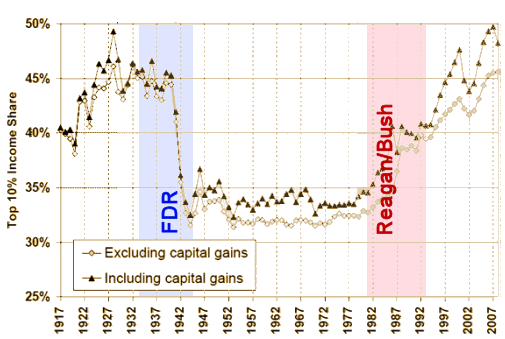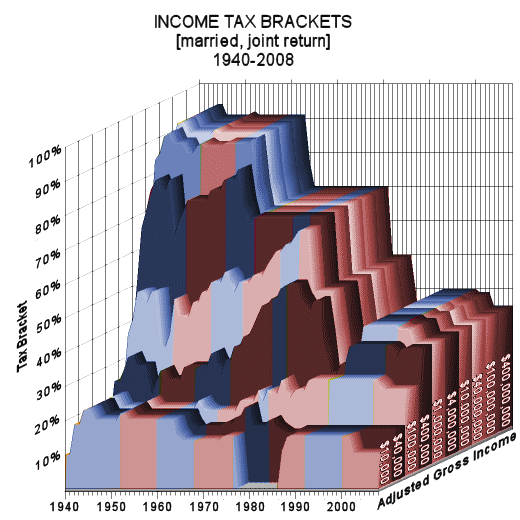I think Timothy Noah’s series [the “Great Divergence”…] is terrific, so these comments are just some things that I think – not intended to detract from his helpful research. I’ve already said that I think he looked at the technology revolution the wrong way [wealth inequity revisited…]. He looked at the direct effect. I think he should’ve considered how the tool that the technological revolution allowed an army of MBA’s and Investors to increasingly refine their skills and move profits "upward." And I’ve agreed with SovereignMind’s point that the data presented comp[aring Democrats and Republicans was flawed [more about wealth inequity…]. But before looking at Noah’s comments about the Conservative arguments, I’d like to point an area where I think Noah might have been off track. He gives the radical tax structure changes and financial deregulation much less impact that I think it deserves:


What’s called the "Great Compression" started with FDR’s heavy taxation of the rich/super-rich to pay for the war and reversed with Reagan’s "untaxation." Whether that was a direct effect or some complex piece of a larger puzzle, the concordance is too striking to pass off as 5% in my book. Likewise, the financial restrictions and regulation during the New Deal and the gradual "deregulation" beginning with Reagan are equally suspect as important parentheses.
I think you have to look at effective tax rates, not the marginal tax rates for each tax bracket, to see the effect that Reagan had on the tax distribution. I’ve done that analysis here: http://sovereignmind.wordpress.com/2010/09/18/reagan-and-the-stinking-rich/
My conclusion is that the argument that Reagan’s tax cuts drastically favored the rich is overblown. It actually made the tax code more progressive for almost everyone, except for the super rich (the top half percentile). I think it’s worth separating the “rich” from the “super-rich”. Based on Timothy Noah’s series and some other research I’ve done, I’d say the reasons why the “super-rich” have increased their wealth are different from the reasons the “rich” have increased theirs.
For the super-rich, the causes seem suspiciously purposeful: favorable tax policy has played a role, I think. As has disproportionate access to lobbyists and deregulation.
For the rich, I think the causes have been more accidental: technology, lagging education, immigration.
I think in the discussion of income inequality it’s worth making this distinction because I think there really are two sets of drivers here, and therefore two distinct issues.